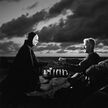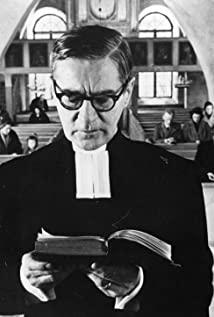In the eyes of American director Woody Allen, Swedish-born director Ingmar Bergman is the most perfect mentor, and in the eyes of Wim Wenders, he is a huge beacon. He always focuses on the struggle of human life and death, spirit and flesh, love and desire. As the most outstanding film artist of the 20th century, Bergman took the lead in raising "movie" to a philosophical topic, and presented the struggle and nothingness of human beings through dreamlike light and shadow and cold thinking like ice ridges. "Does God exist" is the core of his film creation. Through this question, we can see Bergman's worry about the fate of mankind.
Today, we are going through the test of death. If Bergman is still alive, he will ask: "Why does God suffer from aphasia, and death wanders in the world." Unfortunately, this master of art is long gone, we can only Thinking about life and death, existence and nothingness through his works left in this world. I have always admired Bergman's films with a sense of reverence, for I cannot express in any fine word my preference for him, as heavy and sad as such.
In 1957, Bergman made a film called "The Seventh Seal", which was a milestone in Bergman's film career, and thus started the poetic and philosophical journey of the film. In this film, Bergman focuses on issues he has been thinking about all his life: religious beliefs, life and death. Through this film, we can walk into Bergman's struggling heart and his puzzled "Heavenly Questions".
Ingmar Bergman, lit the "magic lamp" and walked back through the fog.
The wildness of the pirate period, the chaos of the late Middle Ages, the defeat of the North Sea hegemony, the cautiousness of the Napoleonic Wars... This is a historical sketch of Sweden in the eastern Scandinavia. Summers here are short and pleasant, and winters are long and boring. History endows the land with its heaviness and simplicity, and the environment endows it with graceful light and shadow.
On the land of Asia, those filmmakers are deeply immersed in realism and cannot extricate themselves, trying to find a way to express their hearts through the creative intention of realism. On the Western European continent, the spread of romanticism allowed people to find temporary comfort in it. As Luc Besson said, "movies are not a cure for the world, but an aspirin." Hollywood directors are immersed in the dream-making function of movies, trying to use technology to present the dreams in people's minds. In this land of northern Europe, film art seems to prefer the unpredictable light and shadow and the cold and alienated environment.
Standing on the Nordic land, Bergman draws nourishment from ancient legends and deep historical culture. His eyes pass through the forest full of mystery, with a preference for fantasy, all of which are integrated into his films. When we talk about Bergman's films, we must start with "The Seventh Seal", and understanding "The Seventh Seal" requires turning on Bergman's "Magic Lamp."
"The Magic Lamp" is the only autobiography of the great master Bergman, five years after the filming of "Fanny and Alexander" and announcing that he ended his film career. This book is not only his personal autobiography, but also his "confessions". In this book, he seriously revealed his creative origin and life course. He did not shy away from his own shortcomings, fears, anger, obsession with Nazis and lust for lust when he was young. Important moments in his life can be found in this book corresponding descriptions.
Bergman once said, "My whole creation is actually based entirely on childhood impressions. I can go back to the situation at any time. In general, anything I do that has some value can be traced back to childhood. Dialectically speaking, I have never been out of my childhood, I have always had a dialogue with my childhood." Without a doubt, the book "The Magic Lamp" is the best population to understand Bergman's creative process, following Bergman's narration , as if returning to the ancient and mysterious Nordic land, returning to Bergman's serious and repressed childhood.
Bergman is the son of a priest, and ritualistic moments such as baptisms, weddings, and funerals form the main memories of his childhood. However, he could not let his father talk about death so frankly. For death, he was full of fear and horror because his honest and honest uncle was buried under the train wheels, and the gentle and beautiful maid was thrown into the river because of the shame of being pregnant out of wedlock. And death, the only brother attempted suicide when he was young, the third wife was killed in a car accident... In the face of these ensuing deaths, there was only one voice in Bergman's heart, "Where has God gone?" ?"
Death, like Bergman's shadow, accompanied him throughout his life. So, with "The Seventh Seal", this film is Bergman's reflection on death. He has longed for God's redemption, but finally found that only love and hope are the best medicine for the world.
In "The Seventh Seal", the shadow of the "magic lamp" on the wall is not only life and death, but also the future.
In The Seventh Seal, Bergman's torture can be seen everywhere, and these tortures originated from his childhood, which are his lingering memories. When the knight played chess with Death, he was torturing, where is God, why did he play chess with Death, the heroic knight who went through the Crusades. Bullock said he needed God's help and God's redemption. But God never appeared, never redeemed him because he was a hero.
The intellectuals represented by Brock at this time were in a turbulent era of change, the rapid development of material civilization, the disintegration and reconstruction of spiritual civilization, and belief gradually became a fragment of the historical trend. Brock, who has experienced war, once regarded God as his belief. He thought that the reason why he was able to come back alive was because of God's help. However, when he returned from the battlefield, he saw the god of death.
From birth to death, Bullock's belief was gradually disintegrated. He began to look for bits and pieces related to God in his memories. He saw love, deception, and death, but he did not see God. In fact, love itself is God. It's just that Brock never believed in love. In the end, Brock closed himself on the isolated island of human nature, questioned the existence of God, slashed all relations with faith with his sword, and finally, he also went to death.
Death in Bergman's films is not a fate but a judgment, as can be seen in other films as well. Many directors regard death as the focus of human destiny, thus giving birth to a sense of nihilistic fate. Bergman is not like this. He has a sense of salvation. He uses death as a judgment to judge the guilty. Although God will be absent, death will not. Death is fair and sober, and he will eventually take away those guilty. , leaving behind people with love and faith.
When Bergman was born, his mother was suffering from a severe Spanish flu, and Bergman was born with severe nutritional deficiencies. An old doctor even decided that Bergman would die. As soon as Bergman was born, he played a game of chess with the god of death, and he has never stopped thinking about death since then.
In The Seventh Seal, we can see Bergman's attitude towards death, which is derived from his childhood experiences. After reading "Magic Lamp", you can find that all kinds of "Seventh Seal" can be found in "Magic Lamp". "The Magic Lamp" is a description of Bergman's life, and "The Seventh Seal" is about Bergman's torture of life and death. Therefore, "The Seventh Seal" is the shadow cast by "The Magic Lamp" on the wall. Between the light and the dark is the hope of life and the silence of death.
Perhaps Bergman did not expect that "The Seventh Seal" would bring such a big shock to the audience. Because history is strikingly similar, wars and plagues have always existed, and people have never stopped discussing life and death, God and death. The Seventh Seal is a door, a door for people to understand the past, and a door for people to spy on the future.
The Seventh Seal is a book of Apocalypse Now, but humans don't intend to learn from it.
On the seaside with monstrous waves, the brave knight Brock is playing chess with the god of death. Crusades, plagues ravaged the land of Europe, and there were couples who had a happy future, couples who were separated from each other, and a solemn memorial ceremony. In the end, the knight and his friends met the god of death again, and in the storm, they danced hand in hand with the god of death, and then gradually disappeared into the darkness.
The beginning of "The Seventh Seal" is "Genesis" and the end is "Revelation". The seaside with huge waves is like the world that has just been separated, with rolling waves on one side and vast land on the other. The book of Revelation at the end is a revelation about life and death. Some people can be forgiven by the god of death because of their love and piety, but those who think they are heroic and wise cannot escape the judgment of fate.
It is very important for an artist to remain highly sensitive to his time, especially for an artist like Bergman. He is nourished by past experiences, but he needs the soil of reality more. Find fragments in reality and assemble them, reflecting the transformation of the entire twentieth century. In Bergman's films, we can follow his torture to clearly see the traces left by the times, as well as the choices of individuals in this historical torrent.
The story background of "The Seventh Seal" is in the Middle Ages. The film involves two historical events, one is the Crusades, and the other is the plague that ravaged Europe. The former occurred in the twelfth century, the latter in the fourteenth century. Bergman put the two events in the film, and used the way of memory to outline the bits and pieces of what happened, which made the film theme have a heavy feeling at the beginning.
In the era when "The Seventh Seal" was filmed, the whole world was in a state of unease and chaos. The Korean War, Vietnam's war against France, the confrontation between the two socialist camps, the second Middle East war, and the Soviet Union's first intercontinental The launch of missiles... War brings death, death brings decay, decay brings plague. The Seventh Seal is like a prophecy, revealing a long-forgotten disaster. Obviously, the crusades symbolized the world situation in the 1950s and 1960s, and the plague symbolized the collapse of civilization.
How is human civilization accomplished? It's war, not technology. Humanity's road to civilization is covered with dark tiles. Desire drives human society forward, and it also brings many disasters. If war means expansion of ambition, then the plague that follows is the judgment from God. From World War I to World War II, where the flames of war spread, life was devastated. The war tore down the last fig leaf of human beings, and passed on the bloodthirsty desire to everyone, just like the spread of the plague, and the god of death was hiding in the shadows and sneering at this time.
"The Seventh Seal" is by no means a tragedy. In the end, Bergman still retains his compassion and love for human society. Knight Bullock once met a couple who worked in a circus. The husband devoutly believed in the gods, and the wife was obedient to it. Because of love and faith in their hearts, they were forgiven by the god of death. At a time when all had to die, they went to a new beginning.
War is Bergman's "seventh seal", which directly points to the sins in human hearts, disintegrates people's kindness and love, and releases people's most ancient and true desires.
Hegel once said that the lesson of history is that people never know how to learn from history. After the release of "The Seventh Seal" in 1957, it caused an uproar in the film industry. They were amazed at such a grand proposition and admired Bergman's calmness and sobriety. Filmmakers, critics, and philosophers analyze the film from different perspectives, connecting the film with the future destiny of mankind. They gave the film the highest honor, they accused the indulgence of human desire, the cruelty of war, and yet, they did not learn any lessons from it.
Today, we are not looking back at history, and proud human beings will never learn from history, but "Why does God suffer from aphasia and death wanders in the world?" The Bergmanian torture still exists, because human beings are cowardly and selfish after all Yes, they were born with original sin, and they needed to spend their entire lives being judged, waiting for the release of the "Seventh Seal", and waiting for an unknown fate.
View more about The Seventh Seal reviews











